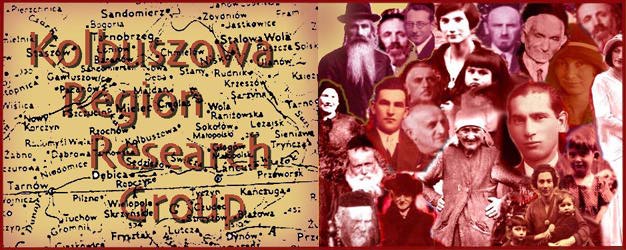


Translated
Report on Ulanów
From the European Office of the American Joint Distribution Committee
[in Berlin] to their American Office, dated 6 Apr 1933
The small town of Ulanów, in the
Nisko district of the Lemberg Department, is on the San river, six
kilometers from the railway at Rudnik. Ulanów has a population of
4,000 Christians and 900 Jews. Most of the Jews are traders or
artisans and a few, who possess a little land, are engaged in
agriculture. Until a few years ago the lumber trade also offered
work, since the San, through the Vistula, has direct connection with
Danzig. But this has now come to a complete standstill.
In view of the crisis and general
poverty, here as well as elsewhere, the need of the Jewish population
is very great.
The help received from
Landsleuten in America is of great help to the Jews here in these
trying times. Thanks to the efforts and assistance of Harry
Hassenfeld, born in Ulanów, who has been in America a long time,
important help for individuals and general purposes is often
received. Mr. Hassenfeld was in Ulanów a few months ago and left
a considerable amount of money.
There is a social house in Ulanów
which was acquired in 1920 by Mr. Hassenfeld through the “Ford” society
in Cracow, an organization for interior decoration. The society
obligated itself to quip a workshop for basket weaving.
The necessary tools were purchased,
the workshop was established, and managed by Mr. Friedmann and Mr.
Birnbaum. It lasted only a few weeks and was then closed.
As far as we could learn, the chief reason for the closing of the
school was the fact that the two men mentioned above left town and no
others could be found who were able to take over their work.
Basket and furniture weaving is
quite extensive in certain districts along the San, since special
plants, which are adapted to making bottle baskets, orange cases, etc.,
are found in large quantities. These plants are called “Wiklinen”
or “Weiden”.
More complicated articles are made
from raw materials obtained from other districts. The peasants in
the villages are the chief producers of the more simple things.
They work with their own raw material, which costs them next to
nothing, since, as we are told, they can get the “Wiklinen” from the
banks of the river as they please, which the Jews cannot do. The
prepared articles are sold to traders. The Jewish workers are
therefore not in a position to compete with the peasants. This
would, however, be possible, if the Jews were to learn, not the simple
work that the peasants can do much more cheaply, but the better and
more difficult manufacture. As a matter of fact, there is a large
modernly equipped government trade school at Rudnik near Ulanów.
Here, among other things, furniture and basket weaving are
taught. There are difficulties in the way of establishing a
similar school in Ulanów for the teaching of the more advanced weaving,
because the social leaders who could be interested are lacking and,
besides, the school would not only be for the Jewish children in
Ulanów, but would also have to accept children from the neighborhood,
and Ulanów is not the proper place for this. The small house that
was purchased through the society named above and later given for the
establishment of a trade school for men in Cracow is likewise not
suitable. This society received $ 2000 from the Joint
Distribution Committee for the purpose of purchasing a site for a
school, but until now nothing has been done and the society is inactive.
The entire equipment has
disappeared from the house in Ulanów and the local population has
turned it into a home for poor transients. It is therefore hard
to start anything with this building, because the town will not give
its permission.
In 1930 the Central in Cracow
attempted to open a workshop to train orphans, but, for the reasons
mentioned above, this was not successful.
© Copyright 2017 Kolbuszowa Region Research Group. All rights reserved.
Compiled by Neil Emmer.